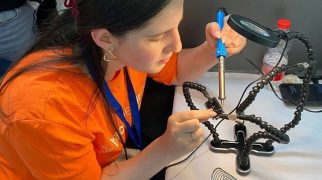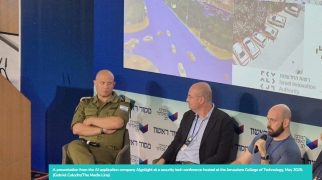September, 2020
As a researcher at the McGovern Institute for Brain Research and the Department of Brain and Cognitive Sciences at the Massachusetts Institute of Technology (MIT), Friedman lives and breathes big data analysis and behavioral neuroscience.
There aren’t many men who cradle their young daughter in their arms while they discuss the finer points of the role that chemical compartments play in normal and aberrant decision-making. But this seems to be a typical Sunday afternoon for Alexander Friedman.
As a researcher at the McGovern Institute for Brain Research and the Department of Brain and Cognitive Sciences at the Massachusetts Institute of Technology (MIT), Friedman lives and breathes big data analysis and behavioral neuroscience.
Yet Friedman has another burning passion that has driven much of his life — Torah. After immigrating to Israel from Minsk as a teenager, he fondly recalls his time at the Jerusalem College of Technology (JCT), where he learned that a love of science and God are not mutually exclusive and can complement each other.
“My family were all involved in science,” he says of those early teenage years. “Initially, I intended to continue in the medical field in Russia. But I took the psychometric exams with the hope that I would be accepted to a school in Israel. I got good scores, even though my understanding of Hebrew was not great. At the time, JCT was taking in Russian groups. Academically I was extremely well-placed, but the language barrier was a difficult challenge. But it was a very rewarding challenge. I learned Hebrew quickly and also made friends.”
Friedman also emphasizes JCT’s unique balance of Jewish studies and secular academics, a central component of the college’s mission since its founding in 1969.
“The Jewish teaching at JCT was fascinating and there were several amazing rabbonim. There, I learned how to study Gemara and the Shulchan Aruch, for example,” he says. And considering that Freidman came from a traditional, but not particularly observant home in the former Soviet Union, this path to a greater connection with Judaism was a new and enlightening one.
He praises his professors at JCT for not just teaching the next generation of would-be scientists and researchers, but for helping bridge the socioeconomic gaps in Israeli society. While members of the Haredi community are gradually entering the workforce in greater numbers, Friedman applauds JCT for doing its part to accelerate that process. In fact, JCT’s Haredi graduates attain an 89 percent employment rate (including 77 percent in their field of choice), far exceeding the roughly 50 percent employment rate for Haredi men in Israel as a whole.
“Places like JCT will make Israel sustainable. These institutions can help sustainably close the gap between secular and religious students,” Friedman says.
Friedman credits his academic experience at JCT with paving his path to MIT today.
“JCT was instrumental in my current success at MIT. I was expertly taught the basics of topics that I am now studying in more depth. My thesis today requires the interpretation of a massive amount of data and I owe JCT a debt of thanks for enhancing my ability to do that,” he says.
Now at MIT, he works with a team on two ambitious projects. The first involves studying brain patterns and what governs decision making. The second revolves around creating computational tools for simultaneous recorded multidimensional data.
“We built a special system where we could research up to 30 animals simultaneously,” he explains regarding the former project, adding that his team’s work was published in the prestigious journal Cell.
For that project, Friedman’s team attempted to prove how anxiety and stress affect decision-making. The research’s everyday implications could be revolutionary. By determining how a certain brain circuit leads to abnormal decision-making, manipulating that pathway and normalizing it could help patients suffering from depression, addiction and anxiety — all factors that lead to poor decision-making.
But as far as decisions go, Friedman is quite calculating about what he chooses to do from one moment to the other. He has a full life in Boston, where in addition to his research and fatherhood, he teaches a class about Hassidic thought.
So how does he do it all?
“To be able to balance everything you need to have an understanding of what is and what is not important. One needs to have a constant focus, because there are so many things competing for our attention,” he explains, with the kind of rational calmness you’d expect from a scientist. “One needs to be capable of starting and finishing a task or project. If you stop in the middle of something, it takes a lot of time and energy to get started again.”
See pg. 21 of JCT’s Perspective Magazine (2020): https://www.jct.ac.il/media/5661/perspective-2020-e.pdf



